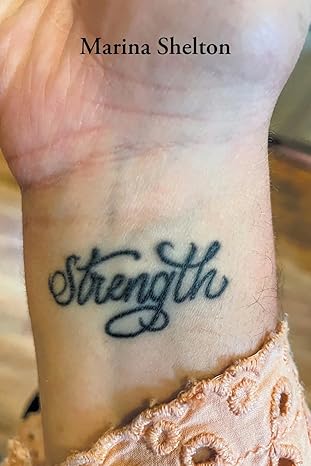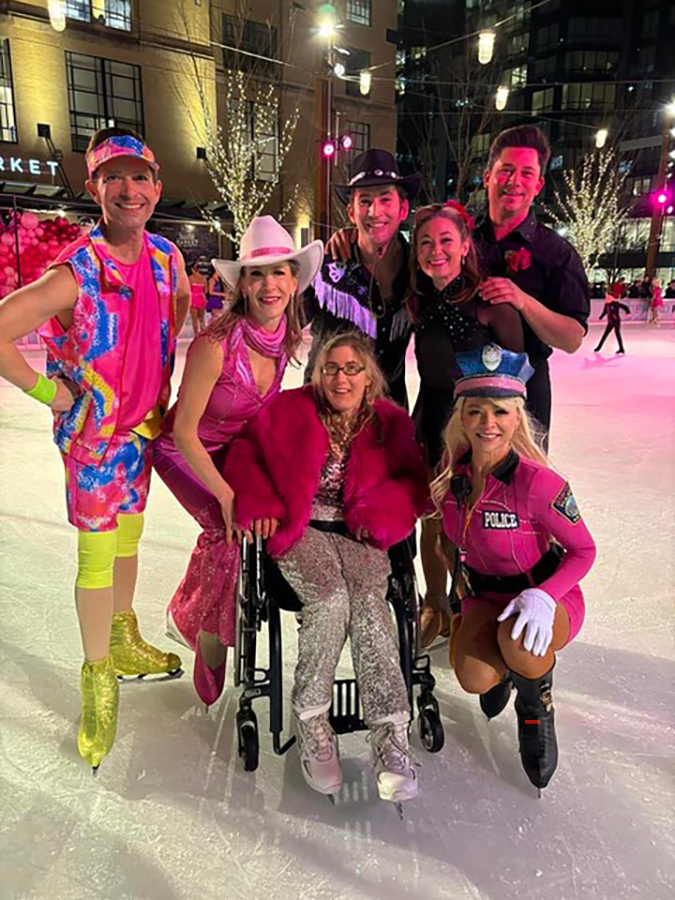Above: Marina Shelton, center, in pink top, is surrounded by fellow skaters and coaches following an inspirational talk and book-signing at the Adult Skate Camp at RiverWalk Resort in Lincoln, New Hampshire.
By Joanne Vassallo Jamrosz
The capacity to withstand great force or pressure is one definition of strength.
For former skater Marina Shelton, strength means that, and much more.

Shelton from Wayland, Massachuetts, grew up in a skating family. Older sister Lara and brother Neill were competitive pairs skaters. The youngest of the three, Shelton was immediately drawn into the sport.
“My brother and sister started figure skating, and I always had to go to their practices,” Shelton said. “It was only a matter of time before I got on the ice myself with group lessons, private lessons and then running my first competitive program. I always loved running my program when I was old enough to have my own.”
However, Shelton’s skating life, as she would know it, came to a halt during a horseback riding lesson when she was 10 years old.
“One day, after a skating session, I went to a horseback riding lesson my parents surprised me with,” Shelton said. “It was a group lesson outside on a trail and through the woods. At some point, the girl on the horse behind me bumped the horse I was on. My horse kicked back at the other horse and threw me off her back.”
The horse then galloped through the woods, with one of Shelton’s ankles caught in the stirrups, dragging her 100 feet.
“I’m only alive because I had a helmet on,” Shelton said. “When the instructor caught up to us, I was unconscious.”
Shelton’s instructor quickly called 911, and she was transported by Med Flight to Boston Medical Center, where she was in a coma for six weeks. She had suffered a traumatic brain injury and fractured her skull. The injury was to the right side of her brain, so the left side of her body was affected.
“Most of the doctors didn’t think I would survive or wake up,” Shelton said. “I opened my eyes after a few weeks but was still comatose. I went to rehab, where I fully woke up from my coma, laughing at a story my mom told me. I was in rehab for five months.”
It was then that Shelton decided to take back her life.
“I’ve kept working out to stay fit and keep my muscles growing,” Shelton said. “I am still active with Access Sport America to improve my walking and physical activities, and I wanted to be someone people look up to for inspiration. I’m happy with my mobility gains but am not ready to stop. I want to see how far I can go. It’s really the spasticity [tightness in my body] that’s keeping me in a wheelchair. I keep getting stronger and more mobile every day.”

Since rehab, when people learned of her story, many suggested that Shelton write a book about her accident and remarkable comeback.
“I have always loved writing stories,” Shelton said. “There’s too much negativity in the world, so I want people to know that even if they’re in a negative spot and things look really bad, if they keep trying, there’s a chance it will get better.”
Shelton began work on her book titled Strength after she graduated high school in 2011.
“It actually took several years of writing and editing,” Shelton said. “The pandemic actually helped, because I had more time. It was a fun experience reliving great memories, but I cried as I wrote others because they were so bad.”
Shelton loves the response the book, published in May 2024, has received. She recently spoke at the Adult Skating Camp at the Rink at RiverWalk in Lincoln, New Hampshire, which featured guest Olympic coaches, and she’s spoken at many schools and universities.
She also had the privilege of joining her brother and sister on ice last February in the Joy Skate production “Barbie on Ice” as Wheelchair Barbie.
“When I was asked to be in the Barbie show as Wheelchair Barbie, I was overjoyed,” Shelton said. “Of course, I would rather be skating, but what was so special about it was that I got to be in a skating show with my brother and sister again. My sister and I even had a brief step-out moment together in the second number. That was really the most memorable part. I loved being on the ice with my siblings again as part of a professional ice show.”
Today, Shelton is happy with all her accomplishments so far, which includes being a motivational speaker and a volunteer and athlete at Access Sport America.
“I’m not happy that I still need my wheelchair, but I actually need it less and less because I keep improving physically,” Shelton said. “I’m happy to see how much better I’m getting. Something positive that came out of my accident is that I’m not afraid of anything anymore. If I’m unsure about trying something new, like when I started getting myself up off the floor with my cane by myself, I’d think about what to do and what could go wrong, but then I’d look at my cane and say, ‘Here goes!’”
She also treasures the message Strength sends to readers.
“I like that they can see that while I’ve experienced something bad, I kept going to do amazing things that someone in my position wouldn’t do,” Shelton said. “I love hearing how inspired people are when they hear my story, and now I hope even more people will be, even if I can’t speak directly to them. I’ve always wanted to change people’s lives for the better.”
Strength can be purchased anywhere books are sold.

